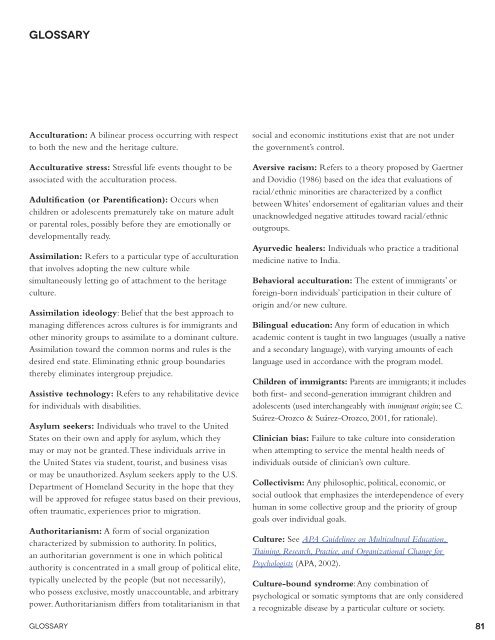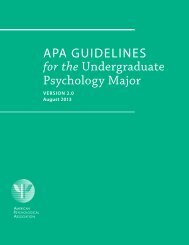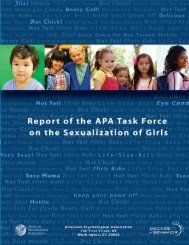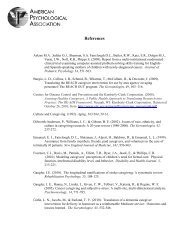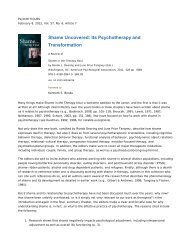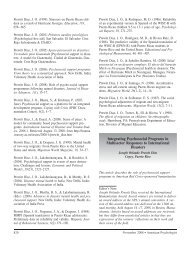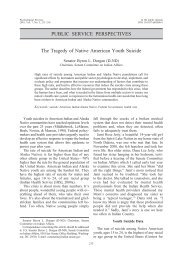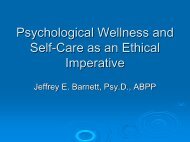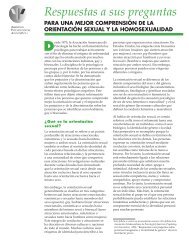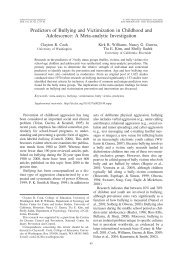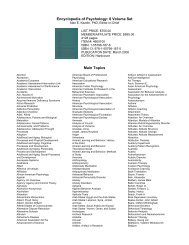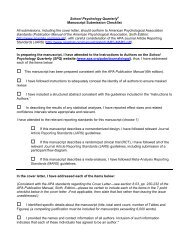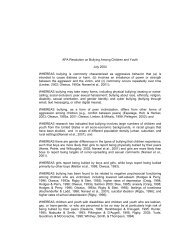Crossroads: The Psychology of Immigration in the New Century
Crossroads: The Psychology of Immigration in the New Century
Crossroads: The Psychology of Immigration in the New Century
You also want an ePaper? Increase the reach of your titles
YUMPU automatically turns print PDFs into web optimized ePapers that Google loves.
Glossary<br />
Acculturation: A bil<strong>in</strong>ear process occurr<strong>in</strong>g with respect<br />
to both <strong>the</strong> new and <strong>the</strong> heritage culture.<br />
Acculturative stress: Stressful life events thought to be<br />
associated with <strong>the</strong> acculturation process.<br />
Adultification (or Parentification): Occurs when<br />
children or adolescents prematurely take on mature adult<br />
or parental roles, possibly before <strong>the</strong>y are emotionally or<br />
developmentally ready.<br />
Assimilation: Refers to a particular type <strong>of</strong> acculturation<br />
that <strong>in</strong>volves adopt<strong>in</strong>g <strong>the</strong> new culture while<br />
simultaneously lett<strong>in</strong>g go <strong>of</strong> attachment to <strong>the</strong> heritage<br />
culture.<br />
Assimilation ideology: Belief that <strong>the</strong> best approach to<br />
manag<strong>in</strong>g differences across cultures is for immigrants and<br />
o<strong>the</strong>r m<strong>in</strong>ority groups to assimilate to a dom<strong>in</strong>ant culture.<br />
Assimilation toward <strong>the</strong> common norms and rules is <strong>the</strong><br />
desired end state. Elim<strong>in</strong>at<strong>in</strong>g ethnic group boundaries<br />
<strong>the</strong>reby elim<strong>in</strong>ates <strong>in</strong>tergroup prejudice.<br />
Assistive technology: Refers to any rehabilitative device<br />
for <strong>in</strong>dividuals with disabilities.<br />
Asylum seekers: Individuals who travel to <strong>the</strong> United<br />
States on <strong>the</strong>ir own and apply for asylum, which <strong>the</strong>y<br />
may or may not be granted. <strong>The</strong>se <strong>in</strong>dividuals arrive <strong>in</strong><br />
<strong>the</strong> United States via student, tourist, and bus<strong>in</strong>ess visas<br />
or may be unauthorized. Asylum seekers apply to <strong>the</strong> U.S.<br />
Department <strong>of</strong> Homeland Security <strong>in</strong> <strong>the</strong> hope that <strong>the</strong>y<br />
will be approved for refugee status based on <strong>the</strong>ir previous,<br />
<strong>of</strong>ten traumatic, experiences prior to migration.<br />
Authoritarianism: A form <strong>of</strong> social organization<br />
characterized by submission to authority. In politics,<br />
an authoritarian government is one <strong>in</strong> which political<br />
authority is concentrated <strong>in</strong> a small group <strong>of</strong> political elite,<br />
typically unelected by <strong>the</strong> people (but not necessarily),<br />
who possess exclusive, mostly unaccountable, and arbitrary<br />
power. Authoritarianism differs from totalitarianism <strong>in</strong> that<br />
GLOSSARY<br />
social and economic <strong>in</strong>stitutions exist that are not under<br />
<strong>the</strong> government’s control.<br />
Aversive racism: Refers to a <strong>the</strong>ory proposed by Gaertner<br />
and Dovidio (1986) based on <strong>the</strong> idea that evaluations <strong>of</strong><br />
racial/ethnic m<strong>in</strong>orities are characterized by a conflict<br />
between Whites’ endorsement <strong>of</strong> egalitarian values and <strong>the</strong>ir<br />
unacknowledged negative attitudes toward racial/ethnic<br />
outgroups.<br />
Ayurvedic healers: Individuals who practice a traditional<br />
medic<strong>in</strong>e native to India.<br />
behavioral acculturation: <strong>The</strong> extent <strong>of</strong> immigrants’ or<br />
foreign-born <strong>in</strong>dividuals’ participation <strong>in</strong> <strong>the</strong>ir culture <strong>of</strong><br />
orig<strong>in</strong> and/or new culture.<br />
bil<strong>in</strong>gual education: Any form <strong>of</strong> education <strong>in</strong> which<br />
academic content is taught <strong>in</strong> two languages (usually a native<br />
and a secondary language), with vary<strong>in</strong>g amounts <strong>of</strong> each<br />
language used <strong>in</strong> accordance with <strong>the</strong> program model.<br />
Children <strong>of</strong> immigrants: Parents are immigrants; it <strong>in</strong>cludes<br />
both first- and second-generation immigrant children and<br />
adolescents (used <strong>in</strong>terchangeably with immigrant orig<strong>in</strong>; see C.<br />
Suárez-Orozco & Suárez-Orozco, 2001, for rationale).<br />
Cl<strong>in</strong>ician bias: Failure to take culture <strong>in</strong>to consideration<br />
when attempt<strong>in</strong>g to service <strong>the</strong> mental health needs <strong>of</strong><br />
<strong>in</strong>dividuals outside <strong>of</strong> cl<strong>in</strong>ician’s own culture.<br />
Collectivism: Any philosophic, political, economic, or<br />
social outlook that emphasizes <strong>the</strong> <strong>in</strong>terdependence <strong>of</strong> every<br />
human <strong>in</strong> some collective group and <strong>the</strong> priority <strong>of</strong> group<br />
goals over <strong>in</strong>dividual goals.<br />
Culture: See APA Guidel<strong>in</strong>es on Multicultural Education,<br />
Tra<strong>in</strong><strong>in</strong>g, Research, Practice, and Organizational Change for<br />
Psychologists (APA, 2002).<br />
Culture-bound syndrome: Any comb<strong>in</strong>ation <strong>of</strong><br />
psychological or somatic symptoms that are only considered<br />
a recognizable disease by a particular culture or society.<br />
81


